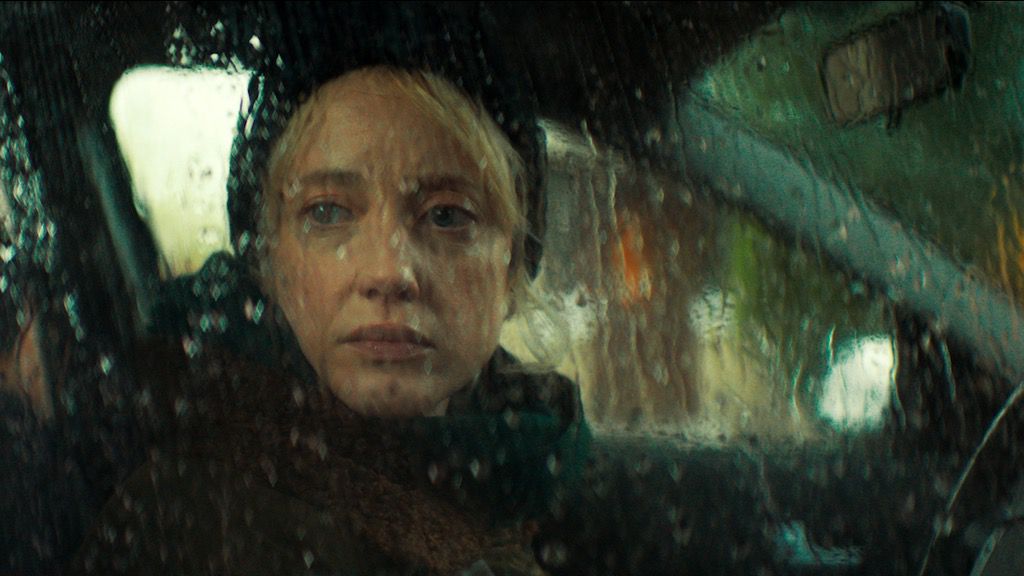This year’s Narrative Feature Competition included numerous directorial debuts, including that of Irish writer/director Stacey Gregg. Her thriller “Here Before” shows a great deal of visual confidence, especially in telling a disorienting story in a domestic setting. And she gets an anxious, melancholic performance from Andrea Riseborough, who continues to be an excellent actor to embed deep into such an emotional nightmare.
Like Riseborough’s earlier movie “Nancy” (written and directed by Christina Choe), “Here Before” deals with a parent’s grief of a lost child, and how they can be further vulnerable to a later sensation when maybe that child has returned. In this case, Riseborough’s Laura is mourning the loss of her daughter Josie, with her husband and teenage son in their home at the top of a hill in Belfast. Laura’s life is progressively thrown out of whack when a young girl named Megan (Niamh Dornan), the daughter of her new neighbors, starts resembling Josie in a lot of ways. And even worse, Megan starts to act like Josie and make it seem like it’s natural for her to want to be around Laura and her family. Laura initially resists the interactions, and tries to set boundaries, but each time that Megan’s mother fails to pick her up at school, Laura feels more pain and jealous. Laura eventually goes all-in on it—she thinks Josie was reincarnated, and it creates a destructive tension between the two neighbors who are progressively offended by Laura’s inappropriate behavior.
The ultimate reveals that come from this type of emotional terrorism turn out to be a mighty stretch of human behavior, especially for a movie that wants to be so grounded and perceptive. However, the twisty script is not what most resonates with this movie, as it’s the cinematic storytelling (the cinematography by Chloë Thomson especially) that creates such unease with its full use of the frame and established sense of space. The interactions between Laura and Megan’s mother Marie (Eileen O’Higgins) become progressively uncomfortable, especially with the visual tension that Gregg imbues in the scenes, like a scene at a grocery store. The camera slowly creeps on another moment in which Laura starts to act like a mother to Megan, even though it’s entirely inappropriate. Grief is richly ominous in “Here Before,” and so is the sense that something is very, very wrong. Gregg’s film presents its unfathomable mystery with memorable style.

“Our Father,” the directorial debut of Bradley Grant Smith, is the story of Beta (Baize Buzan) and Zelda (Allison Torem)—two twenty-something sisters in the Chicagoland area who are in their own isolated worlds of sadness, in need of a type of connection. Beta has been sleeping in her car, we learn later because of a toxic relationship, and her younger sister Zelda has been living in a boarding home with elderly women, while building a relationship with a set designer named Henry. Both of them need the other, as no one should have to go it alone, and there’s a good deal of sadness in the past that they aren’t facing.
They come together when their father dies by suicide, and it turns out to be the two sisters up against their stepmother Jane and her older, sometimes leering sons. They learn during the process of everyone splitting up the dad’s possessions (one of numerous sequences that go for dual quirky/moody valor without leaving much of a mark) that they have an estranged Uncle Jerry, and seek to find him. What follows is not a road trip but a low-key investigation to locate Jerry, a set of plot devices after another in which characters remember information conveniently, and it’s all too staid to leave a mark. The sisters are interesting to follow through this story, especially as their quest takes a type of grief without Smith’s script making too much of a big deal of it.
But the plotting and characters feel more sketched out than written in full, making the script’s indulgences with them all that more obvious. It’s particularly tedious when the script quotes itself, with characters remarking about a piece of dialogue that was just said, like when Zelda says Beta’s remark of “I’m not as sad as I want to be” is a good line. Then there’s the film’s tiresome depiction of how misogynists interact with Beta and Zelda, in which it becomes clear the director wants to show his awareness of telling a story about women. It’s a transparent effort that proves to have little purpose than a writer/director desperately proclaiming they know what women experience even casually. (It’s baffling when a massive emotional scene between a strange man and one of the sisters then takes place up at his apartment, alone, in near darkness. You do not believe the sister would actually ever feel comfortable with it.)
But it’s also the dialogue that can also be the most standout part of the movie, especially as it feels honest to come from Zelda (“Well, we’ll always have that weekend when dad died” is effectively sharp) or later some other, wiser characters. There are bits of compelling elements in all of these people, but they hardly feel grounded, and in turn their journey is less emotional.












